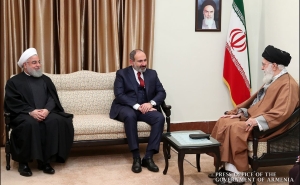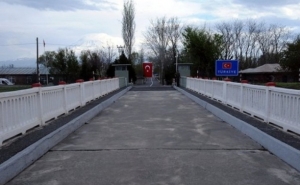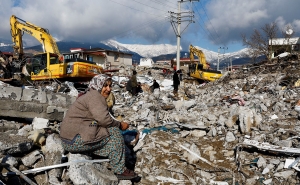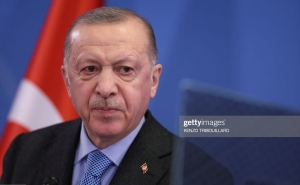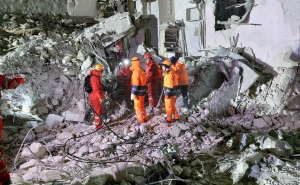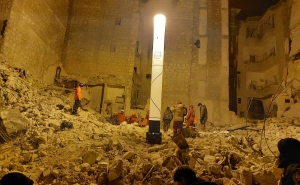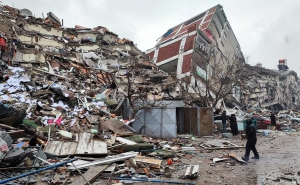How Turkey’s Two-Front War Affects Its Relations with Iran

Turkey’s two-front war against the Islamic State and the Kurdistan Worker’s Party (PKK) has created problems not only inside Turkey, but also in its relations with the neighboring countries. According to the police intelligence report PKK poses a "high risk" in 12 districts in southeastern Turkey, Hurriyet says. This escalation of violence between Turkish security forces and PKK militants has had its negative impact on cross-border situation with Iran.
Trucks carrying goods between the two countries as well as passenger trains and buses have come under attack in Turkey’s southeaster regions, leaving at least one Iranian driver dead. Turkish transportation companies are reporting as much as a 20 percent loss in business, Al-Bawaba reports. As many as 600 trucks crossed the Turkish border into Iran per day to carry goods. This number has fallen to 150 after the recent rise in unrest.
Earlier AFP reported that after those attacks Iran closed its main border crossing into Turkey. "The Bazargan border post into the country has been closed," said Davoud Keshavarzian, head of the road traffic organization. However, he said the border remains open from Turkey into Iran. Iran also suspended train services between Ankara and Tehran after PKK's two bomb blasts on the railway in eastern Turkey. At the same time Iranian officials advised Iranian citizens to avoid grounds trips to Turkey and use air route if necessary due to the security problems in the roads of Eastern Turkey. Iran has also expressed its concerns to Turkey’s ambassador over recent attacks. Ankara blames PKK for these attacks.
The crisis between Turkey and Iran entered a new phase when Iranian Foreign Minister Mohammad Javad Zarif canceled his scheduled visit to Ankara.
The Syrian conflict has been the main problem between the two sides as they support different sides of the conflict and blame each other for creating sectarian tensions between Sunni and Shi'ite Muslims. While Ankara demands the ouster of the Bashar al-Assad regime, Tehran opposes any form of regime change in Damascus. After the signing of the Iranian nuclear deal Iran called on regional cooperation to defeat the Islamic State, noticing that Turkey must respect the sovereignty of Syria and Iraq and coordinate its actions with these countries. Iran said it has 4 point plan to solve the Syrian crisis and is going to represent it to the UN General Secretary.
It is also obvious that after the signing of the nuclear agreement the regional rivalry for influence between Turkey and Iran, which has lasted for decades, entered a new face. Some analysts say the resumption of Ankara’s war against the PKK can further escalate the situation, as Ankara blames Tehran for supporting PKK and using PKK forces as a tool against Turkey.
Other materials on this subject
- ''The Olive Branch'': Ankara Will Not Reconsider its Policy against the Kurds due to International Community's Concerns Due to the developments in Afrin, many Italian political figures have opposed Erdoğan's visit today. The leader of the Left Party of Italy, Nicola Fratognani, urged the authorities of the country ''not...
- Kurds in Syria Call on US Support to Rein in Turkish Operations Turkish President Recep Tayyip Erdogan has said the operation will be expanded to other areas, including Manbij, where American forces are stationed with Kurdish militia.
- Karen Karapetyan Meets with Iraqi Kurdistan Prime Minister Nechirvan Barzani The parties discussed possibilities and prospects for strengthening and developing bilateral economic ties. Prime Minister Barzani assured of their willingness to deepen cooperation with Armenia and boost...
- Two Turkish Soldiers Killed in Kurdish Attack in Southeast Another soldier was wounded in the attack which took place as the troops were carrying out security operations.
- Will the US Suspend Military Assistance to the Syrian Kurds? So, if in reality, the US is not going to suspend the military assistance to the Kurds, what is the disseminated news conditioned by?
Other materials on this subject
- 2 dead, 2 injured after fire at lodging section of Armenian Catholic Church in Istanbul He said the firefighter-rescue team arrived immediately. Armenian Catholic Archeparch of Istanbul Archbishop Lévon Zékiyan was also on the scene.
- Turkey is sending Cold War-era cluster bombs to Ukraine – FP The weapons are designed to destroy tanks by bursting into smaller submunitions, which can linger on the battlefield for years if they do not immediately explode. Each round scatters about 88 bomblets.
- Fire erupts in Turkey’s Black Sea port of Samsun following explosion The causes for the explosion that led to a fire are currently being analyzed.
- EU Urges Turkey to Stop Offering Russia Solutions to Circumvent Sanctions Speaking about the EU's engagement with Turkey, an important neighbor, EU partner and candidate country for EU membership, we stress the importance of ensuring that Turkey's foreign policy is aligned with...
- Any Change of Internationally Recognized Borders in Region is Unacceptable – Iranian President to Erdogan "The basis of our policy in the region is that the fates of the countries must be determined by themselves and that their national sovereignty and territorial integrity must be respected" Raisi told Erdogan...
-
 17:08
17:08The regular session of the Anti-corruption Policy Council takes place in Jermuk
-
 15:05
15:05The Prime Minister sends congratulatory messages to the supreme leader of Iran and the President of Iran
-
 11:11
11:11Armenia sends earthquake aid to Turkey
-
 10:43
10:43Commemoration of the Pontiff St. Sahak Partev
-
 09:16
09:16Some roads are closed and difficult to pass in Armenia
-
 19:55
19:55Phone conversation of the Foreign Minister of Armenia with the U.S. Assistant Secretary of State for European and Eurasian Affairs
-
 18:30
18:30Prime Minister Pashinyan and President Khachaturyan meet
-
 18:20
18:20Ararat Mirzoyan with Co-Chairman of the OSCE Minsk Group of France Brice Roquefeuil
-
 17:01
17:01Humans could land on Mars within 10 years, Musk predicts
-
 16:45
16:45France, US urge 'immediate' end to Nagorno Karabakh blockade
-
 16:01
16:01Blockaded Nagorno Karabakh launches fundraiser to support quake-hit Syria
-
 15:59
15:59Earthquake death toll in Turkey rises to 18,342
-
 15:43
15:43Ararat Mirzoyan Held a Telephone Conversation with Sergey Lavrov
-
 15:06
15:06French president rules out fighter jet supplies to Ukraine in near future
-
 14:47
14:475 Day Weather Forecast in Armenia
-
 14:44
14:44President Vahagn Khachaturyan wrote a note in the book of condolences opened in the Embassy of Syria in Armenia
-
 14:20
14:20Azerbaijan’s provocations impede establishment of peace and stability – Armenian FM tells Russian Co-Chair of OSCE MG
-
 12:57
12:57France representation to OSCE: Paris calls on Azerbaijan to restore freedom of movement through Lachin corridor
-
 11:40
11:40Command of Kosovo forces highly appreciated preparation of Armenian peacekeepers
-
 10:16
10:16The United States withdrew from sanctions against Syria for six months the provision of assistance after the earthquake
day
week
month
Humidity: %
Wind: km/h


